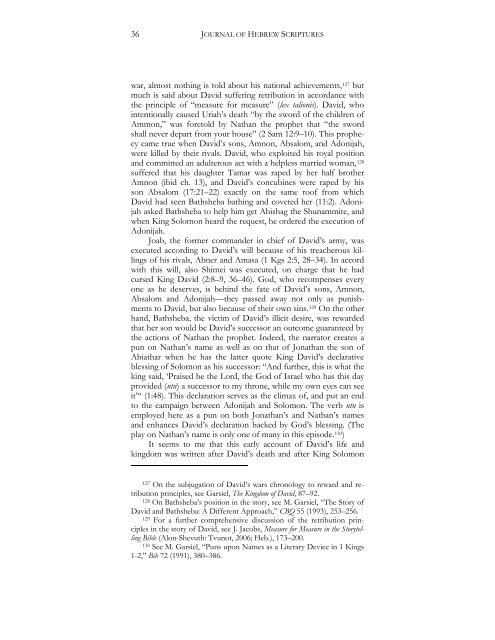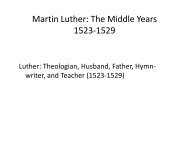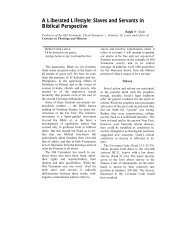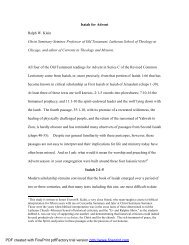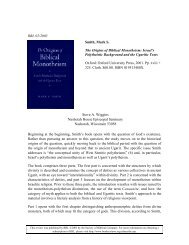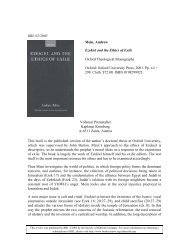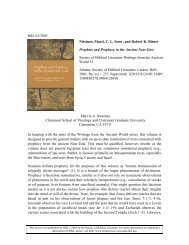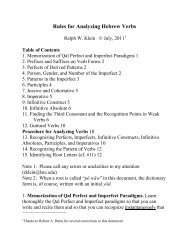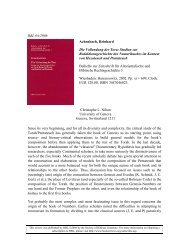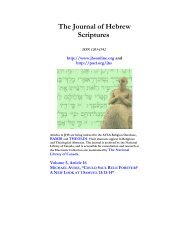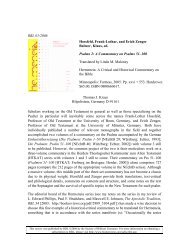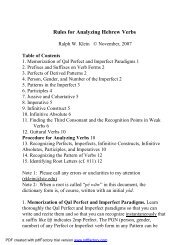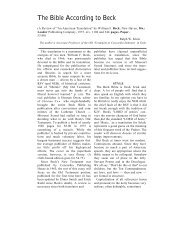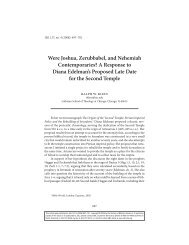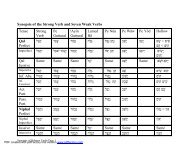The Book of Samuel: Its Composition, Structure and Significance as ...
The Book of Samuel: Its Composition, Structure and Significance as ...
The Book of Samuel: Its Composition, Structure and Significance as ...
You also want an ePaper? Increase the reach of your titles
YUMPU automatically turns print PDFs into web optimized ePapers that Google loves.
36 JOURNAL OF HEBREW SCRIPTURES<br />
war, almost nothing is told about his national achievements, 127 but<br />
much is said about David suffering retribution in accordance with<br />
the principle <strong>of</strong> “me<strong>as</strong>ure for me<strong>as</strong>ure” (lex talionis). David, who<br />
intentionally caused Uriah’s death “by the sword <strong>of</strong> the children <strong>of</strong><br />
Ammon,” w<strong>as</strong> foretold by Nathan the prophet that “the sword<br />
shall never depart from your house” (2 Sam 12:9–10). This prophecy<br />
came true when David’s sons, Amnon, Absalom, <strong>and</strong> Adonijah,<br />
were killed by their rivals. David, who exploited his royal position<br />
<strong>and</strong> committed an adulterous act with a helpless married woman, 128<br />
suffered that his daughter Tamar w<strong>as</strong> raped by her half brother<br />
Amnon (ibid ch. 13), <strong>and</strong> David’s concubines were raped by his<br />
son Absalom (17:21–22) exactly on the same ro<strong>of</strong> from which<br />
David had seen Bathsheba bathing <strong>and</strong> coveted her (11:2). Adonijah<br />
<strong>as</strong>ked Bathsheba to help him get Abishag the Shunammite, <strong>and</strong><br />
when King Solomon heard the request, he ordered the execution <strong>of</strong><br />
Adonijah.<br />
Joab, the former comm<strong>and</strong>er in chief <strong>of</strong> David’s army, w<strong>as</strong><br />
executed according to David’s will because <strong>of</strong> his treacherous killings<br />
<strong>of</strong> his rivals, Abner <strong>and</strong> Am<strong>as</strong>a (1 Kgs 2:5, 28–34). In accord<br />
with this will, also Shimei w<strong>as</strong> executed, on charge that he had<br />
cursed King David (2:8–9, 36–46). God, who recompenses every<br />
one <strong>as</strong> he deserves, is behind the fate <strong>of</strong> David’s sons, Amnon,<br />
Absalom <strong>and</strong> Adonijah—they p<strong>as</strong>sed away not only <strong>as</strong> punishments<br />
to David, but also because <strong>of</strong> their own sins. 129 On the other<br />
h<strong>and</strong>, Bathsheba, the victim <strong>of</strong> David’s illicit desire, w<strong>as</strong> rewarded<br />
that her son would be David’s successor an outcome guaranteed by<br />
the actions <strong>of</strong> Nathan the prophet. Indeed, the narrator creates a<br />
pun on Nathan’s name <strong>as</strong> well <strong>as</strong> on that <strong>of</strong> Jonathan the son <strong>of</strong><br />
Abiathar when he h<strong>as</strong> the latter quote King David’s declarative<br />
blessing <strong>of</strong> Solomon <strong>as</strong> his successor: “And further, this is what the<br />
king said, ‘Praised be the Lord, the God <strong>of</strong> Israel who h<strong>as</strong> this day<br />
provided (ntn) a successor to my throne, while my own eyes can see<br />
it’“ (1:48). This declaration serves <strong>as</strong> the climax <strong>of</strong>, <strong>and</strong> put an end<br />
to the campaign between Adonijah <strong>and</strong> Solomon. <strong>The</strong> verb ntn is<br />
employed here <strong>as</strong> a pun on both Jonathan’s <strong>and</strong> Nathan’s names<br />
<strong>and</strong> enhances David’s declaration backed by God’s blessing. (<strong>The</strong><br />
play on Nathan’s name is only one <strong>of</strong> many in this episode. 130)<br />
It seems to me that this early account <strong>of</strong> David’s life <strong>and</strong><br />
kingdom w<strong>as</strong> written after David’s death <strong>and</strong> after King Solomon<br />
127 On the subjugation <strong>of</strong> David’s wars chronology to reward <strong>and</strong> retribution<br />
principles, see Garsiel, <strong>The</strong> Kingdom <strong>of</strong> David, 87–92.<br />
128 On Bathsheba’s position in the story, see M. Garsiel, “<strong>The</strong> Story <strong>of</strong><br />
David <strong>and</strong> Bathsheba: A Different Approach,” CBQ 55 (1993), 253–256.<br />
129 For a further comprehensive discussion <strong>of</strong> the retribution principles<br />
in the story <strong>of</strong> David, see J. Jacobs, Me<strong>as</strong>ure for Me<strong>as</strong>ure in the Storytelling<br />
Bible (Alon-Shevuth: Tvunot, 2006; Heb.), 173–200.<br />
130 See M. Garsiel, “Puns upon Names <strong>as</strong> a Literary Device in 1 Kings<br />
1-2,” Bib 72 (1991), 380–386.


